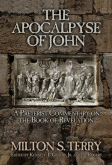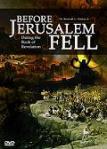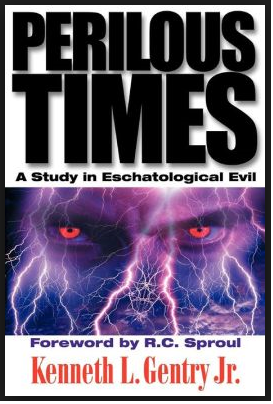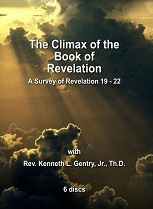TERRY ON AUTHORSHIP OF REVELATION
PMW 2024-006 by Milton S. Terry
The different opinions respecting the authorship of the New Testament books commonly attributed to John may be stated as follows:
1. John, the son of Zebedee, the disciple and apostle of Jesus, was the author of the Apocalypse, the fourth gospel and the three epistles.
2. John the apostle was the author of the Apocalypse, but not of the gospel and the three epistles.
3. John the apostle was the author of the gospel and the three epistles, but not of the Apocalypse.
Those who adopt this third view attribute the Apocalypse either to:
1. A Presbyter John, who is mentioned in early writings.
2. John Mark, the companion of Paul and Barnabas.
3. A John whose only monument is this Book of Revelation and who is otherwise unknown.
Two types of evidence
Our purpose does not call for any extended discussion of these various opinions. But we have discovered no sufficient reason to reject the old and most current tradition that all these Johannean writings are the work of the disciple of our Lord. The external evidence is overwhelmingly in favor of this view and Justin Martyr, Irenæus, Tertullian, Hippolytus, and Origen testify direct testimony that the Apocalypse is the writing of the apostle John. The contrary opinion rests mainly on negative considerations, such as its omission from the early Syriac version and the statement of the Roman presbyter Caius, that it was written by the heretic Cerinthus and published under the name of John in order to obtain for it a claim to apostolic authority.
The more noteworthy objections to the apostolic authorship are based on internal evidence and were well stated by Dionysius of Alexandria (A.D. 250). They have been restated and enlarged by many later writers and have always had weight with critical minds, so that as in the past there will probably ever in the future be not a few who will not be able to concede that the author of the Apocalypse was also the writer of the fourth gospel. The arguments are in substance as follow.
THE APOCALYPSE OF JOHN
by Milton S. Terry
This book is Terry’s preterist commentary on the Book of Revelation. It was originally the last half of his much larger work, Biblical Apocalyptics. It is deeply-exegetical, tightly-argued, and clearly-presented.
For more study materials: https://www.kennethgentry.com/
Internal evidences
1. The apostle does not mention himself by name either in the gospel or in the epistles.
This fact, however, may be sufficiently accounted for by the nature and circumstances of each writing. In a book of prophecy, modeled so conspicuously after that of Daniel, there was special reason for using the forms of expression found in the older apocalyptist. As in the older book there is frequent occurrence of the phrase “I, Daniel” (cp. Daniel 7:15, 28; 7:1,15; 9:2), so the New Testament writer of an apocalypse appropriately employs the words “I, John.”
2. He calls himself servant, brother and partaker in the tribulation (1:1, 9), but not apostle.
It does not appear evident, however, that an apostle could not have appropriately used these expressions and it may be affirmed with much emphasis that there was no other John in the early Church who could have announced himself simply as “John,” and “I, John,” without exposing himself to the charge of unseemly arrogance. Furthermore, he is simply bearing “the testimony of Jesus Christ” to the servants of God and accordingly calls himself most appropriately a servant, brother and fellow partaker “in the tribulation and kingdom and patience in Jesus.” This is in keeping, too, with the tender sympathy of John, the beloved disciple of Jesus.
3. We find in the Apocalypse no trace of apostolical authority, or of the paternal relation assumed in 1 John 2:1; 5:21; 2 John 1; and 3 John 1.
But such authority would have been notably out of place in a book of prophecy like this; and the epistles to the seven churches are in each case announced as coming from the glorified Christ, not from John, who is merely the reporter.
4. It has been urged by some that the names of the twelve apostles on the foundations of the heavenly city (21:14) would have been incongruous in a vision seen by an apostle.
But in view of what Jesus says of the twelve in Matthew 19:28 and what Paul says of the apostles and himself in Ephesians 2:20 and 2 Corinthians 11:5; 12:11, this objection seems trivial and far-fetched. The writer of the vision says nothing of himself personally, but simply states what was shown him.
5. But the most weighty argument is based on the language and style, which are acknowledged on all hands to be very different from what appears in the gospel and the epistles of John. The language of the Apocalypse is peculiarly Hebraistic and Dionysius long ago said that it was notable for its solecisms and barbarous idioms. The book is distinguished for its numerous symbols and visions of things in heaven and on earth; the addresses to the seven churches are stern and lordly, very unlike the manner of John’s epistles.
Instead of the profound, calm and contemplative utterances of the other Johannean writings, we have vivid pictures and symbolic names and numbers. Instead of the spiritual worship taught in the fourth gospel, we have magnificent pictures of cherubim, elders, angels and glorified spirits and all things in heaven and earth and under the earth and on the sea, giving glory to Him who sits upon the throne. The word of God, the Antichrist, the conception of the judgment and the resurrection are all in notable distinction from the same doctrines in the gospel and the epistles. From all these, it is claimed, we must conclude that the author of the Apocalypse is not to be identified with the author of the fourth gospel.

Before Jerusalem Fell Lecture
DVD by Ken Gentry
A summary of the evidence for Revelation’s early date. Helpful, succinct introduction to Revelation’s pre-AD 70 composition.
See more study materials at: www.KennethGentry.com
Response to weightiest argument
The weight and force of this argument cannot be ignored. But for the external testimony, no critic would think of ascribing the Apocalypse to the author of the fourth gospel and the three epistles. Yet this argument from the language and style of thought is largely nullified by three considerations:
First, the subject matter and scope of the Apocalypse place it in a totally different class of literature from that of the gospel and of the epistles. It is a book of prophecy. The addresses to the seven churches are not so much epistles as prophetic messages. The series of visions is not designed to inculcate lessons of Christian doctrine so much as to disclose things which were shortly to come to pass.
Second, being essentially a book of prophecy, not a gospel nor an epistle, it is modeled after the apocalyptic portions of the Hebrew Scriptures. There is scarcely a symbol or figure employed that is not appropriated to some extent from the Old Testament. It is, therefore, not to be supposed that the language, or style of thought, or type of doctrine must resemble those of other productions of the same writer.
Third, the difference of language is further accounted for by the supposition that the Apocalypse was written by the apostle at an early period of his ministry and the gospel and epistles some thirty or forty years later. We may easily believe that John, the Galilean fisherman, wrote just such rough Hebraistic Greek soon after he left Palestine. But after thirty years of life in the midst of a Gentile community, he would naturally have acquired such a command of the Greek language as the fourth gospel shows.
Conclusion
We are accordingly of the opinion that the various arguments against the Johannean authorship of the Apocalypse are not conclusive or sufficient to set aside the best testimony of the early Church. It is not necessary, however, to insist upon maintaining the current tradition of the centuries. The exposition of the book is not dependent upon a certain knowledge of its authorship. The question of its origin is one of those problems of criticism on which there will probably never be uniformity of opinion. Dionysius of Alexandria, while disputing the apostolic origin of the Apocalypse, accepted the book as the production of a holy and inspired man of God. Not a few of the ablest exegetes of modern times adopt the views of Dionysius. It would be a singular infatuation to imagine that God could not have sent this “testimony of Jesus Christ” by some other John than the son of Zebedee.
Click on the following images for more information on these studies:



Kenneth L. Gentry Jr.'s Blog
- Kenneth L. Gentry Jr.'s profile
- 85 followers



